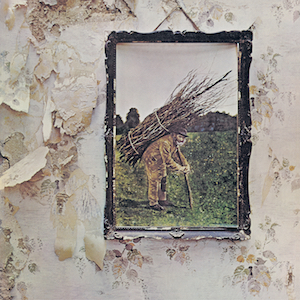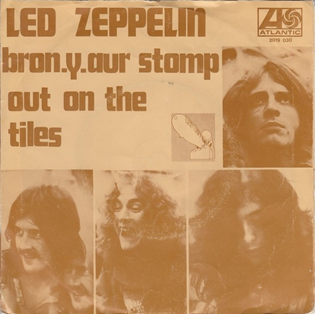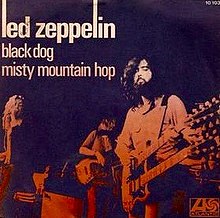
The untitled fourth studio album by the English rock band Led Zeppelin, commonly known as Led Zeppelin IV, was released on 8 November 1971 by Atlantic Records. Produced by the band's guitarist, Jimmy Page, it was recorded between December 1970 and February 1971, mostly in the country house Headley Grange. The album contains the band's most well-known recording, the eight-minute-long "Stairway to Heaven".
"The Battle of Evermore" is a folk duet sung by Robert Plant and Sandy Denny, included on Led Zeppelin's untitled 1971 album, commonly known as Led Zeppelin IV. The song's instrumentation features acoustic guitar and mandolin playing, while the lyrics allude to J. R. R. Tolkien's fantasy novel The Lord of the Rings.

"Black Dog" is a song by English rock band Led Zeppelin. It is the first track on the band's untitled fourth album (1971), which has become one of the best-selling albums of all time. The lyrics contain typical bluesman themes of lust, eroticism and betrayal. The song was released as a single and reached the charts in many countries. It is "one of the most instantly recognisable Zeppelin tracks", and was included in Rolling Stone's 500 Greatest Songs of All Time list (US), and ranked No. 1 in Q magazine's (UK) "20 Greatest Guitar Tracks".
"Going to California" is a ballad recorded by the English rock band Led Zeppelin. It was released on their untitled fourth album in 1971.

"Rock and Roll" is a song by English rock band Led Zeppelin, released as the second track on their fourth studio album in 1971. The song contains a guest performance by original Rolling Stones' pianist and co-founder Ian Stewart. In 1972, American music critic and journalist Robert Christgau called it "simply the most dynamic hard-rock song in the music."
"The Song Remains the Same" is a song by the English rock group Led Zeppelin. It is the opening track from their 1973 album, Houses of the Holy.

"Trampled Under Foot" is a song by English rock group Led Zeppelin. A funk-influenced piece with John Paul Jones on clavinet, it was included on their 1975 album Physical Graffiti. The song was released as a single in several countries and was frequently performed in concert.

"Heartbreaker" is a song by the English rock band Led Zeppelin from their 1969 album, Led Zeppelin II. It was credited to all four members of the band, recorded at A&R Recording and Atlantic Studios in New York City during the band's second concert tour of North America, and engineered by Eddie Kramer.
"No Quarter" is a song by English rock band Led Zeppelin that appears on their 1973 album Houses of the Holy. It was written by John Paul Jones, Jimmy Page, and Robert Plant. The song became a centerpiece at all Led Zeppelin concerts thereafter, until their final tour. It appears in both the film versions and both live album versions of The Song Remains the Same, released in 1976 and expanded in 2007. It appeared once more in 1994 on Page and Plant's reunion album as the title track. It also appears on Led Zeppelin's 2012 live album Celebration Day, which documented their 2007 reunion performance at the O2 Arena in London. It was re-released on the deluxe edition of Houses of the Holy.

"Immigrant Song" is a song by the English rock band Led Zeppelin. It is built upon a repeating riff and features lyrical references to Norse mythology, with singer Robert Plant's howling vocals mentioning war-making and Valhalla. The song was included on their 1970 album, Led Zeppelin III and released as a single. Several live recordings have also been issued on various Led Zeppelin albums. Other artists have recorded renditions of the song or performed it live.
"In the Light" is a song by English rock band Led Zeppelin from their 1975 album Physical Graffiti. The song was composed primarily by bassist/keyboardist John Paul Jones on synthesizer, though singer Robert Plant and guitarist Jimmy Page also received songwriting credits.
"The Rain Song" is a song by the English rock band Led Zeppelin. It was released in March 1973 as the second track on their fifth album, Houses of the Holy.

"Communication Breakdown" is a song by the English rock band Led Zeppelin, from their 1969 self-titled debut album. It was also used as the B-side of the group's first single in the US, "Good Times Bad Times". A promotional video was released, with the group miming to the recording, which is included on the Led Zeppelin DVD (2003).

"Dancing Days" is a song by English rock band Led Zeppelin. It appears on their 1973 album, Houses of the Holy, and was released as a single in the US. It was recorded at Stargroves, England in 1972. It was inspired by an Indian tune that Jimmy Page and Robert Plant heard while traveling in Bombay. This was the first track from the album to be offered for radio play by Atlantic Records. It was premiered on 24 March 1973 on the BBC Radio One Rosko lunch time show.

"Ramble On" is a song by the English rock band Led Zeppelin. Co-written by Jimmy Page and Robert Plant and produced by Page, and recorded in 1969 at Juggy Sound Studio, New York City and A & R Recording, Manhattan, it serves as the seventh track of their second studio album Led Zeppelin II. The song's lyrics were influenced by J. R. R. Tolkien's fantasy novel The Lord of the Rings.
"Friends" is a song by English rock band Led Zeppelin. It was written by Jimmy Page and Robert Plant in 1970 at Bron-Yr-Aur, a small cottage in Wales where they stayed after completing a concert tour of the United States. The song was released on Led Zeppelin III (1970), where it appears as the second track. Biographer Stephen Davis called the piece "Jimmy's [Page's] last stab at psychedelia".
"Celebration Day" is a song by English rock band Led Zeppelin, and the third track from their 1970 album Led Zeppelin III. The band's last concert film and album, released on 19 November 2012, took their name from this song.

"Bron-Y-Aur Stomp" is a song recorded by English rock band Led Zeppelin for their third album, Led Zeppelin III, released in 1970.

"Candy Store Rock" is a song by English rock band Led Zeppelin, released in 1976 on their album Presence. It was also released as a single in the United States, but it did not chart.

"Good Times Bad Times" is a song by the English rock band Led Zeppelin, featured as the opening track on their 1969 debut album Led Zeppelin. The song was Led Zeppelin's first single released in the US, where it reached the Billboard Hot 100 chart.












